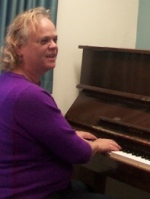
Mix Margaret Dylan Jones
W.A. composer, pianist, teacher, article writer
Specialist in solving singing problemsfor a wide range of musical styles
The Singer's Formant
There are many little things to learn along the way which all contribute to a good sound and a solid technique, but, ultimately, the quality of the soloistic voice comes down to this: the singer's formant (you thought I was going to say 'breathing', didn't you!) Most good singers, in ANY style, have some of this quality, but opera singers absolutely live for it.
The singer's formant is a part of the tone quality (colour), and is somewhere around 3,000 Hz (3 megahertz). Have you ever listened to a jet aircraft taxiing on the runway? It's a bit like that, except that it's also inside the singer's own head. The opera singer's voice produces a whole bunch of very high sounds (around the last few notes at the top of a piano keyboard), all very loud. It's a tremendously DISSONANT, ultra-crunchy, ear-splitting din. But we love it!Close-up, the singer's formant can be very difficult to tolerate. Imagine doing a duet with Pavarotti, cheek-to-cheek, ear-to-ear---absolutely deafening. But a few feet away it will sound lovely (all other things being equal). This sound quality is essential to singing unamplified in a large hall, such as an opera house.
If you listen to two singers in a studio, one with a lot of formant and the other with very little, you might think they both sound pretty good, no problem hearing them. But as soon as you ask them to sing in a bigger room you will find that the sound of the second singer is lost. The formant is needed to 'carry' the voice and to make it heard over other instruments.
I've read several theories about how the formant is produced, the most likely one involves muscles just above the vocal folds called the aryepiglotic sphincter, which manoeuvre the epiglottis when you swallow. In any case, by various techniques, students can learn to switch it on. It's important not to rush this--the formant can be forced, which is to be avoided.
See: Why is reading or hearing about it not the same as having a lesson?
Since May 2011 I've been living in the Perth hills, in the Shire of Mundaring, Western Australia. Click on the links to learn more or contact me by phone or email. My mobile phone is 0414 374 701 (new in Sept 2010).
| Twitter: MixMargaretand |
About PeopleString. Try PeopleString.
http://facebook.com/MixMargaret
Please make suggestions on how to improve this site.

Online Resources
Professional Services
All about Margaret
Third party prodcuts & services
The Singing Zone
Per Bristow's
home study
voice method
My sites
PIANO PAGES HOME
SINGING SITE HOME
RESOURCE REVIEWS HOME
Combined Entry Portal
Combined Sites List